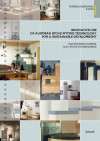Suchergebnisse
Development of a strategy for industrialized serial production of ecological passive houses made out of renewable resources
Development of a strategy for industrialized seria. production of ecological passive solar houses made out of building materials based on renewable resources as foundation for the dissemination of sustainable solutions for the production of prefabricated houses and of single houses.
Workshop: Technologies for solar cooling in tropical climates & guided tour of world´s largest solar cooling System
5. April 2013
Singapore, SG
Main topics of the Singapore workshop: Absorption chilling, Desiccant technologies, Heat rejection, Economics, financing
EKZ - EnergieKompetenzZentrum Großschönau: "Sonnenplatz - 1. European passive house village for test-living" phase of realisation

Integrative approach for the diffusion of the ecologic passive house: village of passive houses for test-living with an Energy Competence Centre on the basis of a sustainable concept for settlement development at Großschönau.
Results of the latest research about thermal use of solar energy in multi-storey housing, prepared for builders and planners

The relevant Know-How in the fields of "sustainable building and energy supply" will be gathered. The information will be transferred to the relevant target groups (building promoters, architects, planners, customers). This will be done during workshops, planning assistance and a catalogue of quality criteria. The focus lies on solar thermal systems for multiple-family houses.
Berichte aus Energie- und Umweltforschung 3/1997 Einflussfaktoren und Strategien bei der Implementierung von umweltverträglichen Abwasserkonzepten in ländlichen Regionen

Identifizierung von Akteuren, Entscheidungsfaktoren, Umsetzungshindernissen und möglicher Strategien
Energie - Forschung und Entwicklung / Ausgaben der öffentlichen Hand in Österreich - Erhebung 2004

Die Mitgliedschaft bei der Internationalen Energieagentur (IEA) verpflichtet Österreich zur jährlichen Erfassung aller in Österreich durchgeführten Forschungs- und Entwicklungsprojekte im Energiebereich. Diese jährliche Erhebung stellt nicht nur eine internationale Verpflichtung dar, sondern erlaubt es auch, die Bedeutung der Energieforschung für Österreich herauszuarbeiten sowie Schwerpunktsetzungen zu gestalten und zu überprüfen.
Eco.District.Heat - Potenziale und Restriktionen leitungsgebundener Wärmeversorgung in Stadtquartieren
Ziel des Projektes Eco.District.Heat ist es, eine strategische Entscheidungshilfe für österreichische Städte zu entwickeln, mit der das Themengebiet leitungsgebundene Wärme- (und Kälte-) Versorgung in städtischen Energiekonzepten in Abstimmung mit energieraumplanerischen Fragestellungen aus ganzheitlicher Perspektive bearbeitet werden kann.
Urban Area Parameter – Kennwerte Siedlungsbewertung für Errichtung, Betrieb und Mobilität in klimaverträglichen Siedlungen
Entwicklung und Abstimmung von Kennwerten für die energetische und ökologische Bewertung von Siedlungen auf Basis der Schweizer 2000-Watt-Arealzertifizierung. Die Ergebnisse bilden einen weiteren Baustein zum Aufbau eines Qualitätssicherungssystems für Siedlungen ähnlich der klimaaktiv Deklaration für Gebäude bzw. der e5 Zertifizierung für Gemeinden.
Sunny research! Sustainable building design with high energy performance for a modern commercial building

Commercial buildings of basic to medium standard are hardly ever designed by a high quality of innovative building services engineering. In the project Sunny research! a sustainable building design with high energy performance was developed. The aim was to adapt the aspects of Renewable Energy, thermal comfort and wellness in work.
Innovative Use Of Austrian Stove Fitting Technology For A Sustainabl Development

Tile stoves in Austria - Clay stoves in Zimbabwe
Forschungsforum
2/2000
Herausgeber: BMVIT
Englisch, 6 Seiten
Downloads zur Publikation
IEA Bioenergy Task 45 Webinar: An introduction to quantifying the climate effects of bioenergy
31. March 2022
Online, AT
IEA Bioenergy invites you to participate to this free international webinar. The webinar will address selected aspects and discussions that can help stakeholders to deepen their general understanding for available tools and methods as well as crucial elements to be considered in the quantification of climate impacts of bioenergy supply chains. This webinar will be held in the frame of IEA Bioenergy Task 45.
IEA Bioenergy Webinar: Synergies of Renewable Hydrogen and Biobased Value Chains - Case Studies
26. September 2024, 15:00 - 16:30 CEST
Online, AT
IEA Bioenergy invites you to the Webinar "Synergies of Renewable Hydrogen and Biobased Value Chains - Case Studies"
Green ICT for Sustainable Consumption? - Exploring Emerging Policies and Open Research Questions
17. - 18. January 2013
Palais Harrach, Freyung 3
1010 Vienna, AT
The event brings together high-level scientists, policy-makers and industry representatives to explore, discuss and address pressing questions on the potentials and challenges of Green ICT for enabling Sustainable Consumption
Fachtagung: Intelligente Stromnetze - Mit Energieinnovationen Chancen für Österreich eröffnen
Am 29. Juni 2015 beschäftigten sich Herr Bundesminister Stöger und E-Control Vorstand Graf und weitere Experten mit der Frage rund um ein dezentrales, flexibles und vernetztes Stromsystem der Zukunft. Der Stream und die Präsentationen zur Fachtagung sind verfügbar.
Workshop: Beitrag der Abfallwirtschaft zur Versorgungssicherheit seltener Rohstoffe?
15. Jänner 2013
Montanuniversität Leoben (MUL)Leoben, AT
In der Abfallwirtschaft ist vor allem ein verstärktes Recycling von Produkten, die kritische Rohstoffe enthalten, essenziell. Während jedoch weltweit grobe Abschätzungen z.B. zu Seltenen Erden in anthropogenen Lagern vorliegen, gibt es derzeit in der EU und Österreich noch keine Untersuchungen.
Trends in der internationalen Energieforschung - Schlussfolgerungen für Österreich
7. Jun 2005
Technisches Museum Wien, Festsaal, Mariahilferstr. 212, 1140 WienWien, AT
Veranstaltung im Rahmen der Energiegespräche
Ökosan 09 - Internationales Symposium für hochwertige energetische Sanierung von großvolumigen Gebäuden
Vom 7. bis 9. Oktober 2009 veranstaltete AEE INTEC in Kooperation mit der Stadt Weiz zum dritten Mal das Symposium "ökosan". Das Symposium mit Poster- und Fachausstellung hat sich mittlerweile zu einer der größten Veranstaltungen zu diesem Thema in Österreich mit erheblicher internationaler Beteiligung entwickelt.
PH-Academy - "Passive house of the future" Academy platform for knowledge transfer between building developers
Builders and developers of residential buildings in low energy and passive house standard were invited to an academically moderated direct exchange of experiences, to turn them into competent users of new technologies.
Sondierung zur Positionierung eines F&E Schwerpunktes "Gebäudeintegrierte Photovoltaik - GIPV" in Österreich
In dieser Studie wird untersucht, ob Technologien der Gebäudeintegrierten Photovoltaik (GIPV) am Standort Österreich international wettbewerbsfähig entwickelt und produziert werden können. Welche Ausgangssituation ist hinsichtlich Positionierung der österreichischen Photovoltaik Wirtschaft und der Forschung diesbezüglich gegeben, welche Schritte wären notwendig, um diese Chance nutzen zu können.
Science Brunch 2 - Foresightstudien / Verhaltensänderungen zur Erreichung der Klimaziele
6. April 2011
edu4you-Veranstaltungszentrum, Frankgasse 4
1090 Wien, AT
Projekte - Gespräche - Kulinarik
